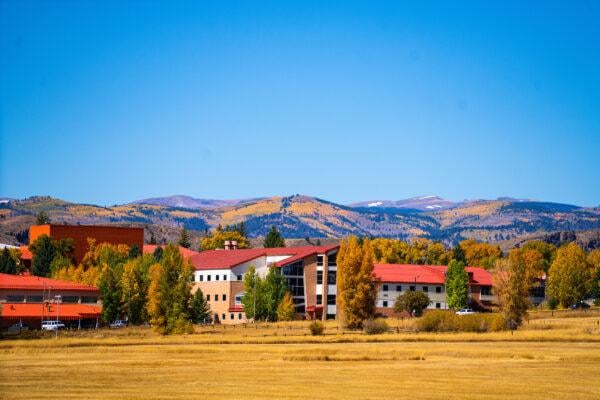Western’s Director of Library Services Dustin Fife serves on the Colorado Department of Higher Education’s Open Educational Resources (OER) Council. The group helps create access to educational resources for students at a free or reduced cost by distributing grants. The council was recently recognized for their work with the 2019 WICHE Cooperative for Educational Technologies (WCET) Outstanding Work (WOW) Award.
The WOW Award highlights colleges, universities and organizations who implement thoughtful, technology-based solutions to modern challenges facing higher education. The OER Council was formed in 2017 through a legislative act in order to build momentum toward open education in Colorado.
The council conducted a statewide awareness survey to help inform the direction of their work. The responses indicated that there was a desire to create a positive return on the state’s investment of financial resources, which included saving Colorado’s college students money on course materials.
The grant program that resulted and the disbursement of funds across institutions of higher education throughout the state is the reason for the OER Councils WOW Award recognition. The substantial contribution to the field of “technology-enhanced higher education” paired with the community outreach and engagement was an example of what can be accomplished when an “organized group of professionals enters into a project with determination, conviction and sound data,” according to WCET.
Fife’s time on the council has been rewarding.
“It’s fun to give money out,” Fife said. “Who wouldn’t love that? But I also get to see it from the other side. I have the chance to see the impact on campus.”
Western was one of 20 state institutions to receive $20,000 grants earlier this year from the OER Council. In total the council gave out $550,000 to fund different projects. The disbursement of these funds across an assortment of campuses and systems – from community colleges to flagship universities – is an integral part of the council’s mission.
According to Fife, it is also one of the strengths of the group. “We wanted to build a movement, meaning that we really wanted to spread money across the state of Colorado.”
Fife is quick to point out the seven faculty members at Western who have adopted OER in their classrooms to help save students money and build more exciting curriculum across a variety of disciplines. Western’s cohort includes Matthew Aronson, Phil Crossley, Brian Dalton, Salif Mahamane, Lynn Sikkink, Zachary Treisman and Cindy Whitney.
“There is lots of research behind it, too, that shows that students who are using open education do better or as well as traditional pedagogical approaches,” Fife said. “What we’re doing here at Western is one of the main things. We really respect faculty freedom and what we’ve done is create small stipends to give to faculty to remunerate them for their time as they go through this process. It takes time to look for new sources, resources to build a new curriculum and adapt their classes.”
There has also been a positive response from students who have benefitted from the OER Council’s grant work.
“The student response…when we told them what we were doing, they were audibly relieved. They were so happy. One student ended up with two of these professors and was so excited to have two professors at the same time,” Fife said.
He understands that OERs are not the magical solution to all of the economic hurdles facing students pursuing a college degree, but he believes they are an important part of the conversation in creating sustainable change.
“This isn’t the answer to fix some of the systemic problems that we have with increasing cost of education. However, this is something that any faculty member can do in their own world, in their own classrooms to help individual students. We still need big answers, but this is an approach that empowers individuals to make a difference in their students’ lives and in their own classrooms.”
The rising cost of education is something that Fife sees firsthand sitting at the library’s front desk in the early weeks of each new semester.
“Sometimes textbooks are a charge or a tax that students didn’t know was coming, especially in their first year. So, students will come in and ask if a textbook is on reserve. They’ll say, ‘Hey, I can’t get this until I get my next paycheck. I can’t get this for a couple weeks.’ There are a lot of complications that this can solve to help students have first day access, which is essential to success.”
Fife said he knows OERs are not always an option in certain coursework. Part of his effort on the council is to create an environment where they are at least a part of the discussion on campuses across the state, including at Western.
“This isn’t for everyone. [Faculty members] need to use the resources that bring the most value to their classes because that’s the point. The education is the point. But we’re trying to encourage a default option where if there is a comparable resource that costs less or is free, why wouldn’t you start there?”



